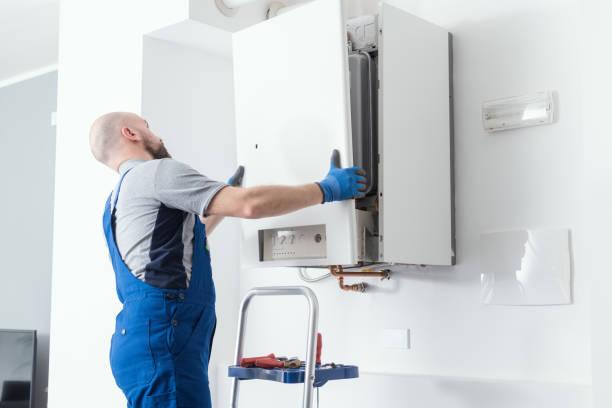Water Heater Maintenance Tips to Extend Lifespan in 2025

Hot water is a daily necessity, whether you're showering, washing dishes, or doing laundry. That convenience depends on your water heaters running smoothly and efficiently. Despite their importance, these systems are often neglected until problems arise.
For homeowners in Compton, CA, regular maintenance is essential due to mineral mineral-heavy supply and seasonal changes that can wear down home systems faster. This guide outlines practical tips to extend the lifespan of your heater and ensure it continues to perform reliably for years.
Why Maintaining Your Heater Matters
Over time, water heaters develop sediment buildup that affects performance. Without attention, they may produce inconsistent temperatures, strange noises, or stop working altogether.
Routine maintenance reduces the chance of early system failure. Whether you're dealing with a newly installed unit or an older one, giving it regular care prevents future breakdowns and improves energy efficiency. Investing in upkeep now saves money on major repairs later.
Flush the Tank to Remove Sediment
In areas like Compton, CA, hard water can cause mineral buildup at the bottom of your heater's tank. This sediment insulates the water from the heating element, forcing the system to work harder and reducing its efficiency.
To prevent damage:
-
Drain and flush the tank once a year.
-
If you experience hard water, consider flushing every six months.
-
Follow safety steps or hire a professional for correct handling.
This routine helps your heater work better and last longer—without frequent water heater repair calls.
Monitor and Replace the Anode Rod
An anode rod protects the interior lining of the tank by attracting corrosive minerals. Over time, this rod deteriorates and loses its effectiveness.
To maintain it:
-
Check the rod every 2–3 years.
-
Replace it when more than half is worn away.
-
Turn off pothe wer and shut off the water supply before removing the rod.
This part plays a major role in preventing rust and corrosion, especially in systems that deal with mineral-heavy water.
Adjust Temperature Settings
Most manufacturers set heater temperatures at 140°F, which is higher than necessary for most homes. Reducing it to 120°F can:
-
Improve safety by reducing scalding risk.
-
Lower energy bills.
-
Reduce stress on the system and internal parts.
This small change can help your unit last longer while still delivering all the hot water you need.
Look for Early Signs of Trouble
Pay attention to indicators that your water heaters might need servicing. Common signs include:
-
Rust-colored water
-
Low water pressure from hot taps
-
Strange noises during heating cycles
-
Leaks around the base
If you notice any of these issues, it’s best to contact a residential plumbing repair expert to diagnose the problem before it worsens.
Schedule Annual Inspections
Annual check-ups by a qualified plumber ensure everything functions safely and efficiently. A trained technician can:
-
Inspect pressure relief valves
-
Clean burner components
-
Check electrical connections and thermostats
Professional support goes a long way in avoiding future emergencies. For those in Compton, CA, companies like Barbosa Plumbing & Sewer offer dependable service tailored to both new and aging systems.
Insulate Your Heater and Pipes
Insulating your heater and nearby pipes reduces water heat loss, improves energy efficiency, and prevents freezing during colder months.
Here’s how:
-
Wrap foam insulation around exposed pipes.
-
Use a fiberglass blanket designed for heaters to retain heat.
-
Avoid covering vents or labels for safety compliance.
These steps help your system maintain warm water without overworking.
Ensure Proper Installation and Placement
The position and installation quality of your unit affect its performance and longevity. Units placed in damp areas or installed improperly may suffer premature wear.
Tips for better results:
-
Keep the heater off direct concrete floors.
-
Provide ventilation around the unit.
-
Use professional water heater installation services to meet code standards.
Smart installation, paired with good home plumbing design, ensures fewer long-term issues.
Final Thoughts
Taking care of your water heaters isn’t just about avoiding cold showers—it’s about protecting your investment. With regular flushing, proper inspections, and smart temperature management, you can extend the life of your system while maintaining steady, efficient hot water access.
In cities like Compton, CA, where residential plumbing systems face added stress due to hard water and older infrastructures, these tips are especially useful. Don’t wait for a breakdown proactive care will save you time, money, and frustration.
For trusted maintenance, installation, and repair, count on professionals like Barbosa Plumbing & Sewer to help you make the most of your home’s hot water system
Frequently Asked Questions
1. How often should I flush my water heater?
At least once a year. In areas with hard water, every six months is ideal to prevent sediment buildup.
2. Is it safe to lower my water heater’s temperature?
Yes. Reducing the setting to 120°F saves energy and lowers the risk of scalding without affecting comfort.
3. What are the signs my water heater needs repair?
Strange noises, rust-colored water, leaks, or inconsistent temperatures are common indicators.
4. Can I do maintenance myself or should I call a plumber?
Basic tasks like draining the tank can be done at home, but it’s best to schedule professional inspections annually.
5. How long does a typical water heater last?
Most tank-style heaters last 8–12 years with proper care. Tankless models can last up to 20 years.

- Art
- Causes
- Crafts
- Dance
- Drinks
- Film
- Fitness
- Food
- Jeux
- Gardening
- Health
- Domicile
- Literature
- Music
- Networking
- Autre
- Party
- Religion
- Shopping
- Sports
- Theater
- Wellness


